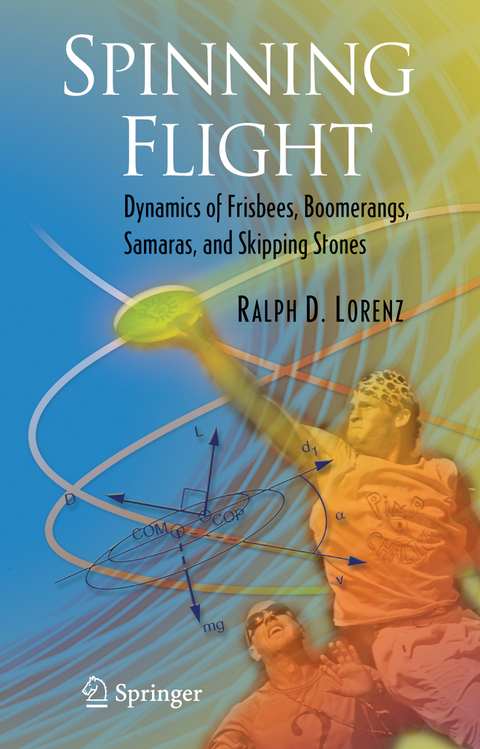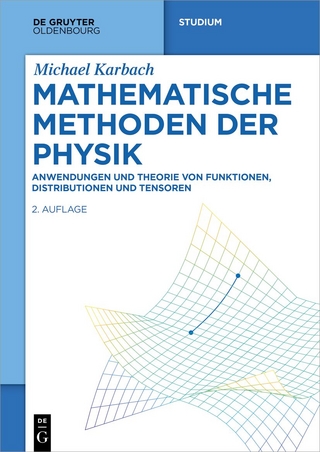
Spinning Flight
Dynamics of Frisbees, Boomerangs, Samaras, and Skipping Stones
Seiten
2010
|
Softcover reprint of hardcover 1st ed. 2006
Springer-Verlag New York Inc.
978-1-4419-2153-6 (ISBN)
Springer-Verlag New York Inc.
978-1-4419-2153-6 (ISBN)
In short, the book discusses a range of familiar, connected, but largely undeveloped, topics in an accessible, but complete, manner.
From the reviews of the first edition:
"In his fascinating book Spinning Flight, Ralph Lorenz provides a rich feast of … examples of spinning bodies … .
More frisbees are sold each year than baseballs, basketballs and footballs combined. Yet these familiar flying objects have subtle and clever aerodynamic and gyrodynamic properties which are only recently being documented by wind tunnel and other studies. In common with other rotating bodies discussed in this readily accessible book, they are typically not treated in textbooks of aeronautics and the literature is scattered in a variety of places. This book develops the theme of disc-wings and spinning aerospace vehicles in parallel. Since many of the examples are recreational, anyone who enjoys these activities will likely find it profitable and enjoyable. In addition to spinning objects of various shapes, several exotic manned aircraft with disc planforms have been proposed and a prototypes built – these include a Nazi ‘secret weapon’ and the De Havilland Avrocar, also discussed in the book. Boomerangs represent another category of spinning aerodynamic body whose behavior can only be understood by coupling aerodynamics with gyrodynamics. The narrative, supported by equations and graphs, explains how the shape and throw of a boomerang relates to its trajectory. The natural world presents still other examples, namely the samaras or ‘seed-wings’ of many tree species, which autorotate during their descent, like a helicopter whose engine has failed. The flight performance of these spinning wings directly affects the dispersal and thus the evolutionary competitiveness of the trees concerned. Samara-type configurations are also considered for instrumentation and other payload dispersal applications. In short, the book discusses a range of familiar, connected, but largely undeveloped, topics in an accessible, but complete, manner.
From the reviews of the first edition:
"In his fascinating book Spinning Flight, Ralph Lorenz provides a rich feast of … examples of spinning bodies … . The book is well organized … . Thediscussion in the book … should be accessible to readers with some elementary understanding of aerodynamic principles. For the expert, the book is full of open problems … . Its scope is extensive … . In this respect, there may be something for everyone within its attractively designed cover … ." (H. K. Moffatt, Nature, Vol. 444, December, 2006)
"If you liked physics at school, then this book is for you. It concerns itself with flying objects that spin through the air, and even tells you how to impress your friends with the biomechanics of Frisbees. … there is plenty of information at all levels, and the book has a wealth of detail that only an aerospace engineer like Lorenz could have come up with." (Len Fisher, BBC Focus, February, 2007)
From the reviews of the first edition:
"In his fascinating book Spinning Flight, Ralph Lorenz provides a rich feast of … examples of spinning bodies … .
More frisbees are sold each year than baseballs, basketballs and footballs combined. Yet these familiar flying objects have subtle and clever aerodynamic and gyrodynamic properties which are only recently being documented by wind tunnel and other studies. In common with other rotating bodies discussed in this readily accessible book, they are typically not treated in textbooks of aeronautics and the literature is scattered in a variety of places. This book develops the theme of disc-wings and spinning aerospace vehicles in parallel. Since many of the examples are recreational, anyone who enjoys these activities will likely find it profitable and enjoyable. In addition to spinning objects of various shapes, several exotic manned aircraft with disc planforms have been proposed and a prototypes built – these include a Nazi ‘secret weapon’ and the De Havilland Avrocar, also discussed in the book. Boomerangs represent another category of spinning aerodynamic body whose behavior can only be understood by coupling aerodynamics with gyrodynamics. The narrative, supported by equations and graphs, explains how the shape and throw of a boomerang relates to its trajectory. The natural world presents still other examples, namely the samaras or ‘seed-wings’ of many tree species, which autorotate during their descent, like a helicopter whose engine has failed. The flight performance of these spinning wings directly affects the dispersal and thus the evolutionary competitiveness of the trees concerned. Samara-type configurations are also considered for instrumentation and other payload dispersal applications. In short, the book discusses a range of familiar, connected, but largely undeveloped, topics in an accessible, but complete, manner.
From the reviews of the first edition:
"In his fascinating book Spinning Flight, Ralph Lorenz provides a rich feast of … examples of spinning bodies … . The book is well organized … . Thediscussion in the book … should be accessible to readers with some elementary understanding of aerodynamic principles. For the expert, the book is full of open problems … . Its scope is extensive … . In this respect, there may be something for everyone within its attractively designed cover … ." (H. K. Moffatt, Nature, Vol. 444, December, 2006)
"If you liked physics at school, then this book is for you. It concerns itself with flying objects that spin through the air, and even tells you how to impress your friends with the biomechanics of Frisbees. … there is plenty of information at all levels, and the book has a wealth of detail that only an aerospace engineer like Lorenz could have come up with." (Len Fisher, BBC Focus, February, 2007)
Aerodynamics of Balls.- Bouncing Balls, Airbags, and Tumbleweeds.- Spinning Bullets, Bombs, and Rockets.- Satellites and Spin.- Encountering Asteroids and Comets.- Planetary Probes and Spinning Parachutes.- Frisbees.- Spinning Cylinders and Rings.- Spinning Aircraft and Nonspinning Disc Aircraft.- The Boomerang.- Samaras.- Skipping Stones and Bouncing Bombs.- Conclusions.
| Erscheint lt. Verlag | 29.10.2010 |
|---|---|
| Zusatzinfo | 16 Illustrations, color; 118 Illustrations, black and white; XXII, 346 p. 134 illus., 16 illus. in color. |
| Verlagsort | New York, NY |
| Sprache | englisch |
| Maße | 155 x 235 mm |
| Themenwelt | Mathematik / Informatik ► Mathematik ► Angewandte Mathematik |
| Naturwissenschaften ► Physik / Astronomie ► Astronomie / Astrophysik | |
| Naturwissenschaften ► Physik / Astronomie ► Mechanik | |
| Technik ► Fahrzeugbau / Schiffbau | |
| ISBN-10 | 1-4419-2153-2 / 1441921532 |
| ISBN-13 | 978-1-4419-2153-6 / 9781441921536 |
| Zustand | Neuware |
| Haben Sie eine Frage zum Produkt? |
Mehr entdecken
aus dem Bereich
aus dem Bereich
Buch | Softcover (2024)
Springer Vieweg (Verlag)
44,99 €
Anwendungen und Theorie von Funktionen, Distributionen und Tensoren
Buch | Softcover (2023)
De Gruyter Oldenbourg (Verlag)
69,95 €


